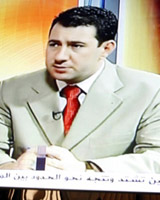UNESCO Director-General condemns murder of Iraqi TV presenter Riad al-Saray
09-09-2010 (Paris)

A clip of Riad al-Saray
© AFP/Sabah Arar
The Director-General of UNESCO, Irina Bokova, condemned the murder of prominent Iraqi television anchorman Riad al-Saray, who was shot dead on 7 September by unknown gunmen in Baghdad.
“I condemn the murder of Riad al-Saray,” said Ms Bokova. “Such attacks on journalists are attacks on the fundamental right of freedom of expression and on society as a whole. Their frequency in Iraq is unacceptable. I call on the Iraqi government to make every effort to bring the culprits to justice and to take measures to improve the safety of media professionals.”
Mr Saray, 35, presented religious and political programmes for al-Iraqiya TV, the state broadcaster. He was shot dead as he was driving in the capital, according to press reports.
The non-governmental organization Reporters without Borders (RSF) said Mr Saray is the 15th al-Iraqiya journalist to be killed since the end of Saddam Hussein's regime. According to the latest RSF report on the risks for the press working in Iraq, 230 journalists and media staff have been killed in the country since March 2003.
Mr Saray, 35, presented religious and political programmes for al-Iraqiya TV, the state broadcaster. He was shot dead as he was driving in the capital, according to press reports.
The non-governmental organization Reporters without Borders (RSF) said Mr Saray is the 15th al-Iraqiya journalist to be killed since the end of Saddam Hussein's regime. According to the latest RSF report on the risks for the press working in Iraq, 230 journalists and media staff have been killed in the country since March 2003.
UNESCO is the only United Nations agency with a mandate to defend freedom of expression and press freedom. Article 1 of its Constitution requires the Organization to “further universal respect for justice, for the rule of law and for the human rights and fundamental freedoms which are affirmed for the peoples of the world, without distinction of race, sex, language or religion, by the Charter of the United Nations.” To realize this the Organization is requested to “collaborate in the work of advancing the mutual knowledge and understanding of peoples, through all means of mass communication and to that end recommend such international agreements as may be necessary to promote the free flow of ideas by word and image…”
Related themes/countries
· Press Freedom
· Iraq
· UNESCO Remembers Assassinated Journalists
· Weekly newsletter
Share this story:
Contact information
- UNESCO Press Release No. 2010–108
Source














